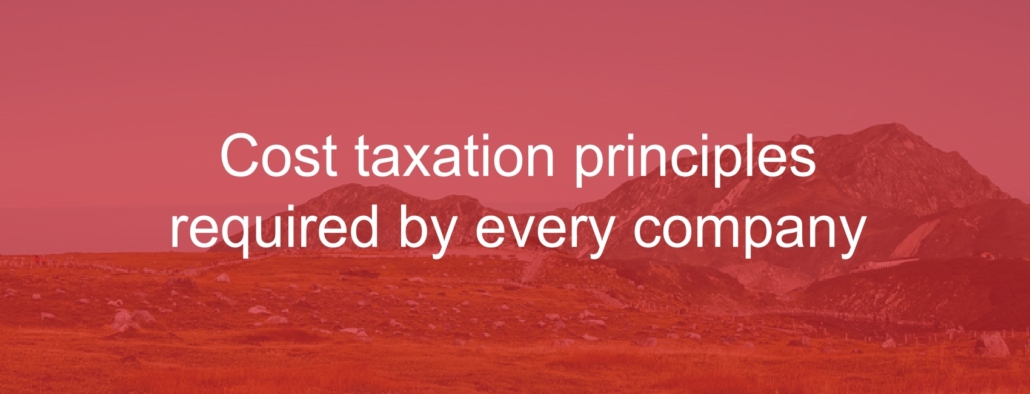Cost taxation principles required by every company
Regardless of the field in which your company operates, you generally need to know what the taxation of costs is, i.e. what the state requires you to pay. You could also find out what the state benefits are so that you will not pay more taxes out of ignorance than you actually should. We are talking about the taxation of costs, i.e. the logic of corporate income tax in Estonia and elsewhere, tax-free and taxable costs, fringe benefits and non-business costs.
Corporate income tax
Income tax is a widely used tax collected by the state from the companies that incur taxable or so-called ineligible expenses.
The income tax rate in Estonia is 20% which applies to the gross amount – this means that if you calculate from top to bottom, you have to withhold 20% of the total amount. If you make the same calculation from the bottom of the net amount, you have to add 25%.
Example:
gross amount 125 – 20% income tax = 25
net amount 100 * 25% income tax = 25
There is actually nothing unique in the application of income tax. The same principle is used elsewhere. However, while in most countries it is common for income tax to be paid on the company’s annual profits, in Estonia we pay taxes on a monthly basis and when we withdraw income from the company or when we incur taxable expenses. Though, if you do not take out income and use it for investments, you do not have to pay income tax.
Income tax practice here and in other countries:
a) common in the rest of the world – annual income tax on the company’s profit, including the adding of “ineligible expenses” to the profit in the income tax return
b) in Estonia
- income tax on dividends, investments tax-free
- payment of income tax (and sometimes also social tax) on “ineligible expenses” on a monthly basis
Tax-free expenses
Tax-free expenses include expenses which connection with the business is clearly justified, which are necessary for the maintenance or development of the business, and expenses arising from the Occupational Health and Safety Act.
In addition, there are a number of costs in Estonia with special rules that do not need to be declared or taxed, but which are subject to certain limits and rules. These are, for example:
- traveling expenses (travel expenses, accommodation expenses)
- home office expenses (utility reimbursement %, repairs, furnishings)
- occupational health costs (health check-up, ergonomics, procedures prescribed by the occupational health doctor).
We also have costs that are subject to special rules and must be declared. Such examples are:
- car compensation (business trips, 30 cents / km, 335 euros / month)
- sports grant (100 euros / quarter; specific list of eligible costs)
Taxable expenses
In Estonia, in addition to salaries and dividends, 3 types of expenses are taxed – these are fringe benefits on which income tax and social tax are paid, gifts-donations-reception costs, which are taxed only with income tax, and the third category is also non-business expenses and payments. Taxable expenses are not refundable.
1. Fringe benefits
In essence, special benefits can be considered as an employee’s salary supplement. These are things that a person would otherwise buy from their net salary. The logic behind this is that if the thing purchased has a monetary value for the employee and is not directly necessary for the business, it is taxed in practice the same way as wages. However, if it is not financially measurable (e.g. flowers) or it is necessary for work (e.g. office chair, pen, car), then it is not subject to fringe benefit. At the same time – if it is a matter necessary for the work, then the price is not important. You can buy any expensive chair or car for your employee, as necessary.
Fringe benefit can be granted on the basis of an Estonian employment contract to an employee, an employee with a contract under the Law of Obligations Act and a member of the management board + their family members. If the company belongs to a group, then also to the employees of other companies. If you have an employee in Latvia, his / her salary and fringe benefit are taxed according to the rules there, he / she is not included here.
Examples of fringe benefits:
- car for personal use and housing costs – both are subject to special rules and limits
- catering – with the exception of the hotel’s breakfast (not indicated separately on the invoice) and training or event outside the city in a tourist farm where there is no other catering available
- selling or giving away your goods / services at a lower price
- purchase of more expensive goods / services
- non-work-related insurance premiums, while travel insurance is not
- interest-free loan, non-recovery of the loan
- training not necessary for work – this does not include general management training, marketing training, financial training, if the company is engaged in investment, then also investment training, etc.
Taxation of fringe benefits in Estonia is similar to salary, except that neither unemployment insurance nor pension contributions are taken into account. Another important difference compared to the salary is that fringe benefit is not personalized. It does not affect the personal average salary or income tax-free calculation and does not apply to bailiffs. This is a pure business expense that is not declared on a person-by-person basis.
price of fringe benefit: 100
income tax: 100*20/80 = 25
gross value of fringe benefit= 100+25=125 (the amount on which income tax has not yet been deducted)
social tax: 125*33% = 41.25
to be paid to the state: 25+41.25 = 66.25
2. Gifts, donations and reception costs
Gifts, donations and reception costs are subject to income tax, i.e. 20/80. These are also subject to various tax-free limits and incentives.
1) A gift is a free service or goods that do not require consideration from the recipient.
A gift does not include a sample of your goods, an advertising gift of up to 10 euros, the write-off of an uncollectible debt or stolen goods, a discount and sponsorship, if the consideration is advertising (then it is essentially a purchase-sale of an advertising service).
2) Donation has always a charitable purpose.
If the donation is made to a NGO included in the list of income tax benefits (it must always be checked, because the list is updated every month), then it is tax-free within certain limits – the limit is either 3% of the gross salary or 10% of the previous year’s profit. If the NGO you are donating to is not on this list, the donation is taxable in the same way as a gift.
3) Reception costs are entertainment provided to business partners, which can be business lunches, cinemas, theatres, parties, receptions, etc. These are events where the company’s business partners are present.
- tax-free limit: 32 euros per month, regardless of the size of the company + 2% of declared gross salaries, cumulative during the calendar year – if you haven’t used it during the year, you can use the full amount in December and have a big Christmas party for your partners.
It is important that you indicate who the participants were at the event. If you have a business lunch check, write the name on. If you have a party, you will add a program and a list of participants.
Also, if the company organizes an on-the-job training day, it is not included in the reception costs and is not taxable.
3. Non – business expenses
In the eyes of the state, the company should not incur non-business expenses at all and this is a less common type of expense than the previous two. This includes statutory penalties, essentially non-business expenses and transactions with low-tax countries.
1) The penalties provided for by law are
- tax interests, tax board fines
- penalty for failure to submit an annual report
- property confiscated in criminal proceedings
- increased environmental charges.
This does not include:
- contractual penalties
- parking fines or fines for delay – it is a matter of whether it is a cost related to the company at all; if the employee violates the parking regulations, it is the employee’s responsibility.
General principle: If the fine arises from law and is imposed by a public authority, income tax must be paid. If the fine is a contractual relationship with a private operator, it is not taxable.
2) Substantially unrelated costs are:
- unnecessary NGO membership fees – membership fees of non-business NGOs. However, in case of professional organizations of employees, such as the Board of Accountants, this is appropriate;
- costs of the owner’s other business – this is very often misunderstood. It is clear that if a company has very clearly ineligible costs, these are subject to income tax. The own expenses of a member of the management board are also taxable with a fringe benefit;
- acquisition of non-business assets, bearing costs;
- undocumented expense – this includes expenses that do not have a check; the alternative is for the person who incurred the cost to return the money to the company, e.g. a member of the management board;
- bribes and kickbacks.
This does not include:
- unnecessary costs paid to employees (these are fringe benefits and are subject to double taxation).
3) (Suspicious) transactions with low – tax countries:
There is no exact list for this, but the tax board has a list of the countries that are NOT considered the low-tax countries. Regular transactions with non-member countries are also generally ok, the transactions that seem like money laundering and are so-called suspicious are subject to tax.
This does not include:
- acquisition of securities
- acquisition of a holding
- high fines for delay and contractual penalties
- granting a loan, making an advance payment
- purchase of an unproven service or goods.
List of countries not considered to be low – tax countries.
In general, such transactions are no longer worth doing nowadays, as both the bank and the accountant are obliged to hand them over to the financial intelligence unit. Note that banks have become significantly stricter with their rules.
Summary
If you are an entrepreneur or company manager, you need to have an overview of what you have to pay to the state. For example, if you give fringe benefits to employees, you have to pay both income tax and social tax, and VAT cannot be reclaimed. However, if you make gifts and incur reception costs, there are also pretty good options for tax benefits.
In general, Estonian entrepreneurs tend to under-utilize tax benefits, which means that they do not know what the practice of taxing costs is and what the opportunities are. By learning about the topic of taxation you can better optimize your tax and ultimately benefit from it.


Leave a Reply
Want to join the discussion?Feel free to contribute!